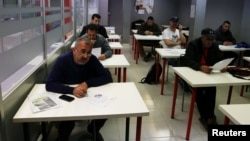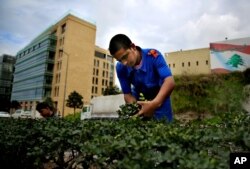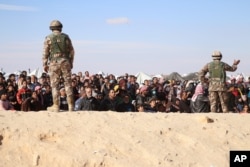Before he was driven out of Syria by the war, Amer Horani’s status as a student was a source of great pride.
The first to go to university in his family, he began studying psychology at Damascus University in 2012 and dreamed of using his education to help others.
Then a friend, a fellow student, disappeared.
“The army came for him. I never saw him again,” the 22-year-old told VOA. The disappearance of his friend was a factor that fueled his decision to leave his country and studies after eight months.
Student life on hold
Along with many others Syrians, Horani was forced to abandon higher education for life as a refugee.
“Everything is bad here,” said Horani, who now works in a small convenience store in the Lebanese capital of Beirut.
It is a country in which well over a million refugees face a daily struggle against local resentment, tough living conditions and restrictions regarding employment.
“Sometimes it feels like I have lost everything - here, my life has stopped,” he said. “I’m not a criminal, I’m not bad. I just want to study.”
Of the 250,000 Syrians previously in higher education, it is estimated that as many as 200,000 have fled their war-torn country.
The obstacles preventing them from re-entering education as refugees are many. Though a lack of money is often the biggest factor, language issues or absence of necessary documents to register at a university are often the issue.
“This is the most challenging higher education emergency we have ever faced,” acknowledged the Institute of International Education’s (IIE) president, Allan Goodman.
Overstretched
Media attention has focused on the efforts of Syrians to reach Europe. But so far, the vast majority - over 4.5 million - are living in Syria’s neighboring countries of Lebanon, Turkey and Jordan.
Within these countries, already stretched by the intake of refugees, efforts are ongoing to provide help and assistance.
In Lebanon, the Ministry of Education and various U.N. bodies are in talks over the issue, with 300 scholarships being made available this year.
Overall, an estimated 10,000 Syrians are enrolled in higher education programs in Lebanon, and, according to one report, around 5,000 people are enrolled in Turkey, with nearly 1,000 scholarships offered.
The overall, figures, however, do not specify how many are refugees.
“I’d be amazed if the number of Syrian [refugees] back in higher education were more than a few thousand,” said Goodman.
“There’s not the capacity in Jordan or Lebanon or even Turkey.”
Going global
Efforts to address the crisis have gone global.
IIE has partnered with universities across the world to help more than 500 Syrian students and 100 professors - one of a number of organizations seeking to bridge the gap.
Others, meanwhile, are improvising in an effort to help.
In Berlin, a social enterprise has launched Kiron University, which offers online courses specifically aimed at refugees.
Meanwhile, though Oxford University already has ties with Syrian higher education, engineering student Thais Roque decided to launch her own scholarship scheme for the university -- one focused purely on refugees.
Set to benefit students who start studies in 2017, the hope is to raise enough for 20 scholarships -- something that, with a few extra fees waived, could cost in the region $320,000.
“I can’t believe how many emails we’ve been getting -- some have said that this is their last chance [to get higher education]” she said, calling for others to follow her lead.
“We are students too -- we just happen to be luckier than them.”
Lost generation
The gap between what is offered and what is needed, however, remains vast.
According to Goodman, the creation of a ‘university of exile’- similar to one created in New York specifically for refugees during WWII - could provide a template. He said the idea is being “investigated” by IIE.
Some governments have taken an active role in helping refugees access higher education.
But far more must be done to avoid losing a generation of Syrian students, said Mahmoud Khalil of Syrian higher education focused organization Jusoor, which offers scholarships through partnerships with 37 universities around the world.
“NGOs can only do so much in providing scholarships. We can’t do this alone -- we need governments, and government universities, to do more,” he said.
For Horani, getting back into university remains a huge challenge.
However, his desire to become a psychologist remains - and he is aware that in Syria, his training and skills would be more important than ever in the war-torn country.
“After the war,” he said, “everyone in Syria is going to need someone.”






